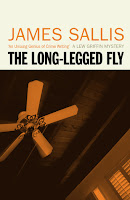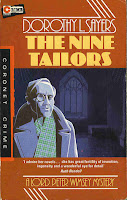I read and reviewed 99 books in 2015. Here are my favourite fiction books read in 2015 (5 star reviews). For
full reviews of each book click on the links and to see all 99 reviews click here.
The Laughing Policeman by Maj Sjowall and Per Wahloo
In my opinion The Laughing Policeman a masterclass in how to write a realist police
procedural novel that does not rely on coincidence or plot devices to
move the story along, nor does it concentrate on a non-conformist, lone
cop (plus sidekick) who singlehandedly solves the case whilst coping
with all kinds of personal issues. Instead, the case is solved through
patient, diligent investigative work by a team of cops, involving a lot
of footwork, collaboration, probing, leaning on informers, petty
criminals and suspects, and wandering down blind alleys. The story is
completely gripping as the dyspeptic Beck and his team inch towards
solving the death of their colleague and eight other passengers shot
late at night on a Stockholm bus.
A Fine Dark Line by Joe Lansdale
A coming of age tale set over the summer of
1958 in town of Dewmont, East Texas. The
voice is pitch perfect and Lansdale drops the reader into the world of
an innocent thirteen year old boy living in a liberal family in a
socially and racially divided society as he learns of the world’s
various vices, some of its terrors, and how to survive them. The
characterisation is excellent and there’s a clear sense of character
development as the story unfolds. Where the tale really excels is the
sense of place and time, and the plot. The result is a taut,
tense mystery that is vividly told and keeps the reader engaged and
guessing until the final page. I thought it was a wonderful, poignant
and riveting read.
The Long-Legged Fly by James Sallis
A wonderfully emotive tale underpinned by strong character development
and observational philosophy. Sallis’ narrative subtly explores race
and gender in the Deep South, and reflects on the intricate webs of
social and political relations and histories people are bound up in.
Sallis revels in the question ‘what does this all mean?’,
with Griffin looking for answers on the street and the bottom of a
glass. The prose is a joy to read.
Strange Loyalties by William McIlvanney
What separates McIlvanney’s crime fiction from most is, I think, its
literary sensibilities. While his stories are very much of the crime
genre and are dark and gritty tales, they are crafted with prose and are
rich in philosophical reflection. In Strange Loyalties Laidlaw
is trying to come to terms with the untimely death of his brother, picking
away at questions that no-one wants answered except him. While it's not the most cheery of tales it is compelling and haunting
with Laidlaw seeking a truth that he knows he does not want to know.
The Nine Tailors by Dorothy L Sayers
Sayers’ book rightly deserves plaudits for being a classic crime fiction
tale, ticking all the key boxes - intriguing and clever plot, a thorny
puzzle, excellent contextualisation, nice characterisation and
interaction between characters, a strong sense of place, and literary
prose. Essentially the tale is a whodunnit set in a small English
village in the fens, centred on a Church and its bells, and the legacy
of a robbery some twenty years previously. The plotting is intricate
and well executed with minimal use of plot devices, and while the tale
strays a little from social realism at times it nevertheless hangs
together coherently and is rounded off with an ingenious but plausible
denouement.
Red Joan by Jennie Rooney
An engaging and thought provoking traitor’s tale, Red Joan tells the story of a woman recruited at university by the Soviets who went on to become a leading spy at an atomic research centre and her subsequent interrogation many years later. The narrative structure works very
well, aided expressive prose, nicely crafted characterisation, and a
carefully constructed plot. A particular strength of the story is how
Rooney unsettles any straightforward black and white reading of being a
traitor, providing a layered, nuanced and poignant account that
gradually exposes a long held secret and its consequences, and explores
themes of motive, ideology, conscience, guilt, regret, and protection.
The Pale House by Luke McCallin
Set in the closing stages
of the Second World War, McCallin has his German detective, Reinhardt, conduct a
murder investigation in Sarajevo. He weaves a clever, compelling and somewhat complex
plot, nicely capturing the fear at work in the city, the tension
within the German ranks and between them and their Croatian
collaborators. Reinhardt is a somewhat sombre character, but his
principles and role as a flawed but ‘good German’ in a corrupt regime
makes him an interesting anti-hero. I particularly liked the very strong sense of place and historical context. Overall, an excellent
historical crime tale.
The Peripheral by William Gibson
It’s easy to understand how some readers might get frustrated with William Gibson’s writing style. In The Peripheral
he uses a raft of made-up slang and neologisms, new cultural norms and
invented technologies without ever explaining them. He just plunges the
reader into the narrative. The result however is worth the
disorientation. The plot is ingenious and nicely constructed, with
Gibson exploring the unfolding arc of history and the interplay of
politics and technology, and speculating on the fate
of humanity.
These books all received 4.5 stars and make-up the rest of my 'best of' list for 2015.
Hotel Brasil by Frei Betto
In The Wind by Barbara Fister
Angels Passing by Graham Hurley
The Instant Enemy by Ross Macdonald
The Dead Ground by Claire McGowan
Bull Mountain by Brian Panowich
The Godwulf Manuscript by Robert B Parker
Mort by Terry Pratchett
The Vanished by Bill Pronzini
Rosa by Jonathan Rabb
Rough Riders by Charlie Stella
Unholy Ground by John Brady









1 comment:
Thanks for gathering these all in one place, Rob.
Post a Comment